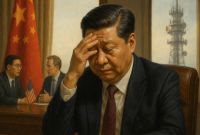Chinese Economy Faces Bleak 2025 Amid Property Crisis, Tariffs, and Sluggish Growth

The Chinese economy is bracing for a tough 2025 as a combination of domestic challenges and external pressures casts a shadow over growth prospects. The optimism generated by a sharp rally in the Chinese stock market in October 2024 has quickly dissipated, replaced by fears of continued economic slowdown. Weak domestic consumption, a prolonged property crisis, and the anticipated return of Donald Trump—along with his promises of steep tariffs on Chinese goods—have added to the already grim outlook.
Recent measures by Beijing to stimulate equity markets and boost consumer sentiment have done little to allay concerns. JP Morgan noted that negative wealth effects from falling property values, declining equity markets, and lower deposit interest rates have eroded household confidence. These factors have compounded existing economic headwinds, including sluggish manufacturing and muted retail activity, creating a challenging environment for policymakers.
The World Bank has downgraded China’s GDP growth forecast for 2025 to 4.3%, citing unclear objectives of government stimulus measures and persistent structural issues. Aaditya Mattoo, Chief Economist for East Asia and the Pacific at the World Bank, emphasized that stimulus efforts might fail to address consumer concerns over declining salaries, property incomes, and job security. Meanwhile, the International Monetary Fund (IMF), which had previously upgraded its outlook for 2025, has now reversed course, warning of prolonged risks tied to the property sector and geopolitical fragmentation.
Adding to the uncertainty, Trump’s proposed tariffs on Chinese goods—ranging up to 60%—could deliver a severe blow to China’s economy. Goldman Sachs estimates that even a 20% tariff would reduce GDP growth by 0.7%. Huang Yiping, a member of the Monetary Policy Committee of the People’s Bank of China, urged Beijing to roll out additional measures to stabilize domestic demand in anticipation of such trade tensions. Markets have already reacted sharply to Trump’s electoral victory, reflecting heightened fears among global investors.
Major financial institutions have expressed cautious views on Chinese equities. Morgan Stanley recently downgraded China to “slight underweight” due to concerns over earnings growth and market valuation. JP Morgan highlighted a decade-long decline in corporate profitability, with return on equity dropping from 15% to 11%, while analysts at Goldman Sachs remarked that economic policy support may have diminishing returns.
China’s ability to deploy further monetary stimulus appears limited, with some experts pointing to a “liquidity trap.” Erik Lueth, Global Emerging Market Economist at Legal and General IM, noted that current measures may not suffice to revive growth. As global economies prepare for solid expansion in 2025, China’s struggles highlight a critical period of adjustment for the world’s second-largest economy. With domestic and external challenges mounting, Beijing faces the daunting task of navigating its way out of this economic quagmire.




![From Kathmandu to the World: How Excel Students Are Winning Big [Admission Open]](https://nepalaaja.com/img/70194/medium/excel-college-info-eng-nep-2342.jpg)
